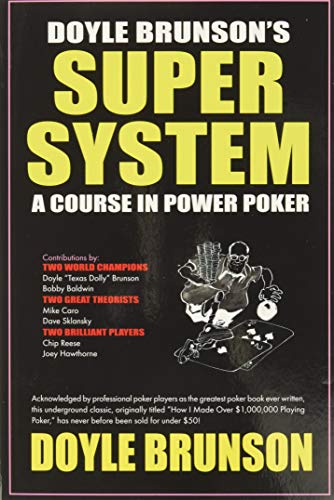Seven Card Stud High/Low No Qualifier Rules and Basic Strategy
Rules of the Game
Seven Card Stud High/Low No Qualifier (Stud NoQ) is a split pot Seven Card Stud game where the best high hand splits with the best low. The high card on 3rd street is forced to bring-in the action but afterwards action starts on the low board.
As the name suggests there is no qualifier for the low hand. This means that low hands have an immense advantage in that they are often free-rolling players erroneously playing high hands.
This game was popular for quite some time and was even written about in the original SuperSystem. Frankly it seems amazing that the game was able to last so long with so many players playing it so incorrectly that they essentially had no chance to win. Nowadays there is a plethora of good information online and elsewhere and back then it took a lot longer for ideas to circulate.
A few years Stud NoQ began to make a semi-comeback in some mixed games, however, everyone seemed to play it reasonably well and there wasn’t much action so it seemed to die a second death. We include it on Counting Outs mostly because it is still one of the games available to choose in the WSOP Dealer’s Choice events. And you will occasionally see it in some cash games at the WSOP.
Basic Strategy
The starting hands you want to play are the best low oriented hands that you would play in Stud Eight or Better (Stud8). Three suited lows, three lows with straight possibilities, and two aces with a low card are the premium starting hands. With your pair of aces an eight is usually the highest card you want to have with them but with such a high side-card it’s way better that it’s hidden in the hole.
High pairs are unplayable because your chances of winning the entire pot are slim and you will often be getting free-rolled very early in the hand. Even rolled-up kings should be folded unless the pot is multi-way but even then they are marginal. A multi-way pot on 3rd may quickly turn into a heads-up pot on 4th and when it continues on as multi-way you are in peril of getting jammed in and not know where you stand. Your hand is obvious so people can fold when you pair your board but straights and flushes can punish you on 6th when you haven’t. Low trips can sometimes be played in the right situations because it’s not obvious what you have and you have the possibility to win the pot without a showdown when you catch a scary low board.
Since high pairs cannot play medium pairs with another low card become playable in Stud NoQ. Hands such as (6A)6 and (77)2 are mostly folds in Stud8 but are more playable in Stud NoQ. Since high pairs are not typically playing you are no longer in danger of being sandwiched by both a better high and a better low. It’s important that your medium pair be somewhat high otherwise your opponent is more likely to overtake your high by pairing one of his cards. Note that (27)2 is way weaker than (77)2; not just because your pair is wired but your pair of sevens is way better than a pair of twos and in both cases you have the same low draw.
Moving onto 4th street it is vitally important to understand that not all bricks are the same. In Stud8 if both you and your opponent are going low and you catch a king and he catches a nine that was a decent result for you. Neither one of you made progress towards a qualifying low but the king helps you somewhat on the high side. That same turn of events in Stud NoQ is a disaster as it highly limits your chances to scoop. If you make two pair or better the best possible low you can make is a king. If you started with a premium low hand that can possibly make a straight or a flush you can continue on, but if your hand was marginal to begin and your opponent caught good it is most often time to fold.
As you move further in the hand you must continually try to assess who has the greatest opportunity to scoop and shouldn’t be afraid to push what may seem like small edges. When everyone is playing reasonable it’s these value bets and raises that will give you your edge.
Further Learning
SuperSystem by Doyle Brunson and others, (Rating 10/10) – The chapter written on Stud NoQ by David Sklansky is excellent not only for this particular game but highlights key fundamentals for all split pot games in general.

